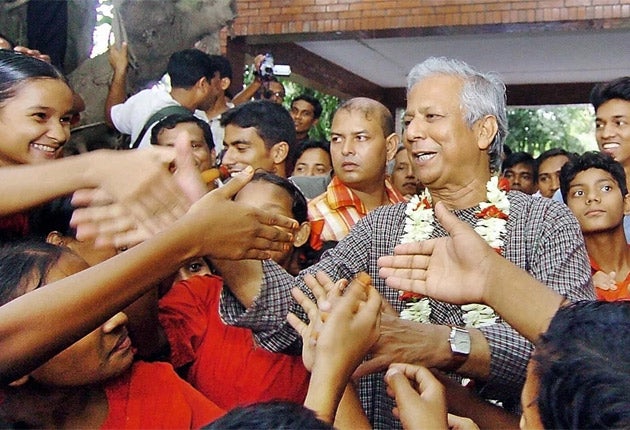A room full of Nobel Peace Prize winners: now that’s something special
The Nobel Peace Prize is a small and highly select but rather strange club


Your support helps us to tell the story
From reproductive rights to climate change to Big Tech, The Independent is on the ground when the story is developing. Whether it's investigating the financials of Elon Musk's pro-Trump PAC or producing our latest documentary, 'The A Word', which shines a light on the American women fighting for reproductive rights, we know how important it is to parse out the facts from the messaging.
At such a critical moment in US history, we need reporters on the ground. Your donation allows us to keep sending journalists to speak to both sides of the story.
The Independent is trusted by Americans across the entire political spectrum. And unlike many other quality news outlets, we choose not to lock Americans out of our reporting and analysis with paywalls. We believe quality journalism should be available to everyone, paid for by those who can afford it.
Your support makes all the difference.The 13th Summit of Nobel Peace Laureates in Warsaw this week might have been held in the dungeons of Warsaw Castle for all the international coverage it garnered: only the satin trouser suit of guest-of-honour Sharon Stone prevented it from sinking without trace. The expectation, I suppose, is that this is an airy-fairy gabfest, with no bearing on the world outside.
But the proposal made this week by Laureate Muhammad Yunus about the Bangladesh garment industry suggests otherwise. Yunus is in the line of fire. Critics in the West snipe at the microfinance he pioneered, claiming that it is discredited. (That, he said, was the fault of greedy hedge fund managers and the like, who saw it as a way to make money out of the poor for their clients. Microfinance is supposed to bring the poor out of poverty, not to make the rich even richer.)
But Yunus remains impressively calm: like the rest of the Laureates, he has courage to spare. Lech Walesa is another such: founder of the independent trade union Solidarity, he was the single person most responsible for the dismantling of the Soviet Union’s European empire.
Walesa was the summit’s patron. Today he is a Polish institution, so stern and rigid – in contrast to the beaming, floppy-haired electrician on the Gdansk barricades – that he seems carved from granite. He rejects the idea that it was he who broke the resolve of the Polish Communist Party and thereby set in motion the collapse, a decade later, of the whole Soviet system. It was God, he said this week, acting directly through the new pope that He had caused to be elected, John Paul II. But it was Walesa’s vision, courage and charisma that mattered more than anything.
Mairead Maguire was a secretary in Guinness’s Belfast brewery when three of her sister’s children were killed by the runaway car of a Provisional IRA man who had just been shot dead by British soldiers: within weeks she and Betty Williams had created Belfast’s anti-sectarian Peace People.
Yunus was a professor of Economics in Bangladesh after its war of independence from what was then West Pakistan. Where, I asked him, did he get the idea of lending money to the poor? “It was desperation,” he replied: to be in close quarters to the poor and seeing nothing being done to help them, while the loan sharks squeezed them dry. So he put his hand in his pocket and lent money of his own, with no interest and no collateral. The money came back, and microfinance was born.
What is on his mind now is the garment industry, following the Rana Plaza collapse and other disasters that have followed. In his view the greatest disaster of all is the wages the women workers are paid. Characteristically, he is not interested in the compensation deals, and even less impressed by the threat of European boycotts, which would only hurt the workers more. Bangladesh’s garment industry is now the second biggest in the world after China’s, he said, the reason being that its wages are the lowest: while the UN sets the level of extreme poverty at an income of $1.75 per day, many garment workers earn only 11 US cents per hour – less than a dollar a day.
That, in his view, is the real scandal. Doubling the rate of pay, he said, would only put $1 on the finished products. Now we need a Mairead Maguire-like figure to launch a mass campaign in Britain to achieve that.
Who now thinks Obama should have won?
The Nobel Peace Prize is a small and highly select, but rather strange, club. Think the Dalai Lama and Henry Kissinger, President Obama and Mairead Maguire, Lech Walesa and Mikael Gorbachev. Once you are in you can never leave, like the Hotel California, whatever your opinion of those brought on board subsequently.
Several people in Warsaw told me they were glad that Malala Yousafzai did not, as widely predicted, win this year’s prize: not only because it would be doing a disfavour to someone still at school, but because it would be as much an award to her promoters as to her.
President Obama’s selection in 2009 was also politically charged – and he would have been scarcely more welcome in Warsaw than Mr Kissinger. At one session, moderator Ghida Fakhry, late of al-Jazeera, asked de Klerk and Shirin Ebadi and the rest of her panel to raise their hands if they approved of the awarding of the prize to President Obama. Not one was raised.
Join our commenting forum
Join thought-provoking conversations, follow other Independent readers and see their replies
Comments